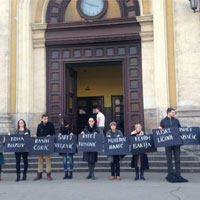Crime in Štrpci – 25 years without justice for victims

On Tuesday, February 27 2018, it will be 25 years since the crime in Štrpci, when members of the Republika Srpska Army (VRS), at the railway station in Štrpci (BiH), abducted 20 passengers from a train operating on the Belgrade-Bar route, and then killed them. They were all non-Serb civilians. The Humanitarian Law Center (HLC), Women in Black, the Sandžak Committee for the Protection of Human Rights and Freedoms, and the Youth Initiative for Human Rights, would like to remind the public that the families of the victims have been waiting for 25 years for judicial justice in Serbia and for recognition of the status of families of civilian victims of war.
The victims of this crime were: Esad Kapetanović, Ilijaz Ličin, Fehim Bakija, Šećo Softić, Rifat Husović, Halil Zupčević, Senad Đečević, Jusuf Rastoder, Ismet Babačić, Tomo Buzov, Adem Alomerović, Muhedin Hanić, Safet Preljević, Džafer Topuzović, Rasim Ćorić, Fikret Memović, Fevzija Zeković, Nijazim Kajević, Zvjezdan Zuličić and one unidentified person.
The mortal remains of only four victims have been found to date. The body of Halil Zupčević was discovered in late 2009 on the bank of Lake Perućac, whilst the mortal remains of Rasim Ćorić, Jusuf Rastoder and Ilijaz Ličina were discovered at the same location in 2010. The other victims are still unaccounted for.
So far, only Nebojša Ranisavljević and Mićo Jovičić have been finally convicted for this crime. In the court proceedings against Nebojša Ranisavljević conducted before the High Court in Bijelo Polje (Montenegro), it was established that a group of members of the Višegrad Brigade of VRS, led by Milan Lukić, forcibly stopped the train at the Štrpci railway station and took 18 Bosniak passengers, one Croat and one person of an undetermined identity off the train, and then transported them in a military truck to the premises of the elementary school in Prelovo near Višegrad. After having confiscated all their objects of value and beaten the prisoners, they tied them with a wire and drove them to an abandoned house in the nearby village of Mušići, where they ordered them to lie down. Then Milan Lukić and Boban Inđić killed them. During that time, Ranisavljević kept guard in front of the house. When one of the abducted passengers tried to escape, Ranisavljević wounded him. Milan Lukić then killed him. In 2003, Ranisavljević was sentenced to 15 years in prison.
During the trial of Ranisavljević, and on the basis of “Beograd” Railway Company documentation, it was established that the abduction had been planned in advance and that the representatives of the authorities of Serbia and the Federal Republic of Yugoslavia (FRY) were familiar with the existence of a plan to abduct the Muslim passengers at the Štrpci railway station. The Railway Company informed the Ministry of Defense of the Federal Republic of Yugoslavia, the Užice Corps of the Yugoslav Army and the State Security Agency, but nothing was done to prevent the abduction.
Mićo Jovičić, against whom a proceeding was conducted before the Court of Bosnia and Herzegovina, admitted that he participated in the beating of the civilians, and that he kept guard during the abduction from the train and killing of the passengers; he concluded a plea agreement in 2016 with the Prosecutor’s Office of Bosnia and Herzegovina. On the basis of that agreement, he was sentenced to five years’ imprisonment.
For this crime in Štrpci, the trial of ten of the accused is ongoing before the BiH Court – including of Luka Dragičević, commander of the Višegrad Brigade, and Boban Inđić, commander of the Intervention Unit of the Višegrad Brigade.
In Serbia, for the crime committed in Štrpci, the Office of War Crimes Prosecutor (OWCP) filed an indictment in March 2015 against five persons. To date, the court has not confirmed the indictment, but has instead repeatedly kept returning it to the OWCP for amendment.
The families of the victims, most of whom are Serbian citizens, have been increasingly ignored by state authorities responsible for the care of civilian victims of war (Ministry of Labour, Employment, Veteran and Social Affairs) for over two decades. Mothers, fathers, children, spouses and other relatives of the victims of this crime, owing to the discriminatory legal framework in Serbia, are deprived of the right to obtain the status of family members of civilian victims of war only because their family members were killed outside the territory of Serbia, although they were its citizens. With this status, they would be provided with symbolic personal benefits in the form of monthly cash allowances and social support.
The victims and their associations, as well as the HLC and other civil society organizations, have been pointing to the inadequacy of the existing legal provisions and their discriminatory implementation for years. Despite the serious objections of domestic and international actors, this law has not yet been altered.
The HLC, Women in Black, the Sandžak Committee for the Protection of Human Rights and Freedoms, and the Youth Initiative for Human Rights once again invite the Office of War Crimes Prosecutor and courts to resolve as soon as possible the issues regarding the confirmation of the indictment for this crime, and to continue with the proceedings; they also call upon the Ministry of Labour and other competent institutions to adopt a new law based on the Model Law on the rights of civilian victims of human rights violations committed during and in connection with armed conflicts in the period 1991-2001, which contains normative solutions for the realization of victims’ rights in accordance with international human rights treaties and other international standards in providing reparations to victims.
The HLC, Women in Black, the Sandžak Committee for the Protection of Human Rights and Freedoms, and the Youth Initiative for Human Rights will mark the 25th anniversary of the crime in Štrpci on Tuesday, February 27th, 2018 at 15:48, in front of the entrance to the Main Railway Station in Belgrade.






